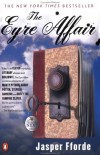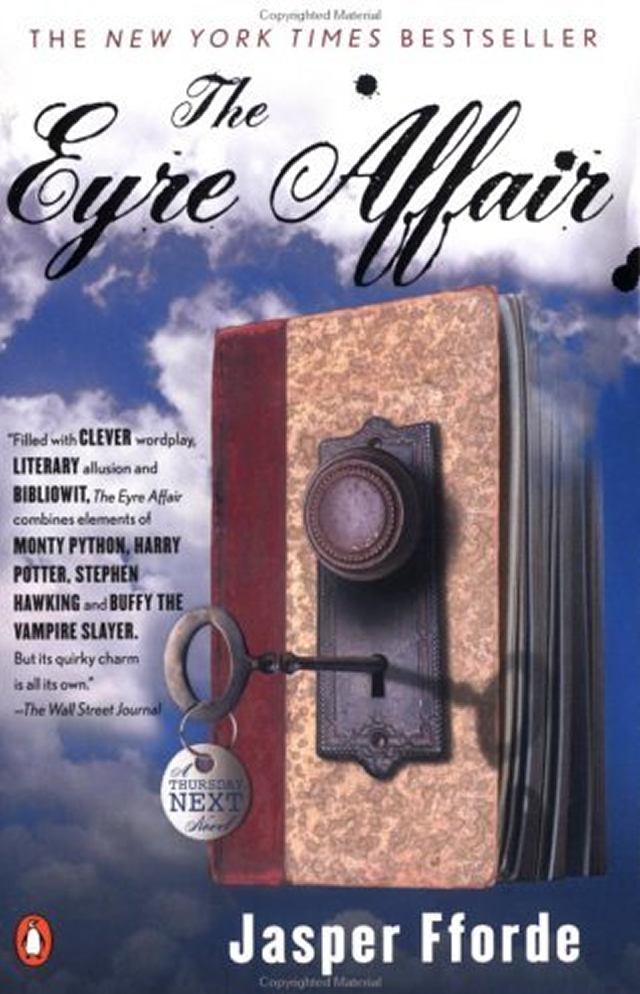 The Plot
The Plot
Thursday Next lives in a world where time travel is possible, cloning is something everyone can do, and where the general population is as passionate about the arts as they are about religion in ours. As a result, literary forgeries, copyright infringements and book piracy are high profile crimes, and Next is a LiteraTec, a detective whose main focus is on dealing with all crimes involving literature. But even she is surprised when crimes against literature turns into crimes against literary characters: after her uncle Mycroft invents a machine that allows people to literally enter a book, it turns out that said machine can also be used to remove characters from the book into the real world. Now the master criminal Acheron Hades is threatening to destroy several of England’s most beloved classics, and Thursday Next has to stop him.
My Thoughts
I had heard good things about this series before we chose to read it, but I didn’t know (and had chosen not to find out) any details, because I wanted to go in without having been spoiled. Having had few expectations, then, it would be a bit silly to say it wasn’t as anticipated — except it wasn’t, a bit.
The world of Thursday Next is an alternate Earth of some kind. Much is similar to our own world, but much more is different. Now, in my past experience with series of books set in an alternate history of Earth, the differences tend to hinge on identifiable differences between that world and ours which have then rippled forward and caused historical divergence. For example, in Naomi Novik’s Temeraire books, the big difference is the existence of dragons and their kin, and this has affected world history in ways which are still being explored. In Jo Walton’s Small Change books, the UK agreed to terms with Nazi Germany and withdrew from WWII before it really got underway, leaving many of the upper classes still able to indulge their fascist sympathies. The setting in Kate Elliott’s Spiritwalker trilogy may be rather too changed to really be called an alternate history, but Strange Horizons has an incredibly in depth analysis of it available for the interested.
So what am I getting at here? Well, in all of the three examples above, the author has thought carefully about the changes they were making and how the ramifications altered the world. While reading, the worlds make internal sense. This was not the case for the setting presented in The Eyre Affair. There are plenty of changes in this alternate Earth, but they don’t seem to hang together well at all. This is a world where time travel is possible and incredibly advanced bioengineering is embarked upon by amateurs at home — and yet their computers still operate with valves and tubes? I’m sorry, what? The technology is out of whack.
There are also lots of clever asides and nudges at history embedded in the text, a number of which I’m sure I didn’t pick up on, being American and well versed in U.S. history rather than British or European. Some were important: the Charge of the Light Brigade has been shifted up a hundred years or so (the war in the Crimea is still going on as the book opens), for instance, and is an important touchstone for the heroine, Thursday Next, as she is a survivor. Others seemed, perhaps, to be setting up for future plot in the ongoing series, but this was less clear.
Part of the problem is that Fforde seems to have fallen victim to the impulse to say too much about the world, far before it was necessary. There’s a reason authors reveal things slowly and only when they need to: first, excess information can bog down the narrative and confuse the reader; second, once you’ve said something, it’s out there and you’re stuck with it — even if you have a better idea of how to handle it in a later book, when you’re actually going to focus in on it. Sure, you can retcon, but that just makes the fans angry.
A secondary result of the information packing (beyond the added confusion and internal contradictions) was that the actual real plot of the book — the danger posed to literature and to the world by Mycroft Next’s Prose Portal — felt like it didn’t ramp up until well past the midpoint of the novel. Once it did get properly underway, the narrative tightened up almost immediately and became far more readable and coherent. Enjoyable, in fact: it was a good idea and an interesting one, and I think it should have been given more pages than it was allotted. The title of the book, after all, is The Eyre Affair, not How Thursday Next Came to Be in Swindon That One Time.
In Short
This book was hampered by the fact that it wanted to be more clever than it actually was. Fforde didn’t seem to decide until halfway through if he was writing a punny Xanth romp or a novel with a plot that was going somewhere; once he settled on the latter, it got better and wrapped up not unsatisfyingly. For anyone who enjoys trying to pick out every sly reference and allusion in a work, this book would be a gold mine. For those who aren’t as enamored of such things, it’s not bad, if you can wade through the confusion of the first half (which is considerable.) Will I seek out the rest of the series? I can’t say I’m chomping at the bit, but I won’t rule it out.


You give more credit to the latter part of the book than I do. I do agree there’s a definite change a little past halfway through. You stop thinking ‘what the heck is going on here?’ and can actually read the story. I just didn’t find the story that interesting or compelling. And still a bit muddled as to where she was going and what she was doing.
Were they cloning at home? I did not come away with that impression. I thought she’d bought the dodo. If you were doing your own home cloning, would they really have model numbers? Wouldn’t you see more customization? I know if I made my own dodo, I’d splice in some flamingo.
My impression was that they were purchased as kits at the store. Bring it home, make your own dodo. So they weren’t exactly doing it from scratch, but it wasn’t dodos at a pet store either.
Certainly Uncle Mycroft was cloning and splicing at home with his worms, though.
After the middle point, I found the muddle was mostly gone, except for the part where he was forced to account for his time travel at the beginning of the book.
Oh, I forgot about the worms. There’s just so much random _stuff_ in there, that I could make a list of all the weird things going on and still leave off several things.
I think the sheer amount of random stuff detracted from the book as a whole, definitely. It got to be just so much that it was impossible to ignore the looming question of why the hell is this society so fricking advanced in technology compared to us? There was no reason given for this whatsoever. And if Fforde had been content to leave it at just a few important things, it might not have been so annoying. I can accept that tech develops differently in an alternate history. Suspension of disbelief is okay. Just don’t expell it. :P
I definitely agree about the excessive amount of random stuff. I was most irked by the whole “let’s go fight some vampires” part. Notice how the coworker, Spike, is utterly dropped after that point? I wondered what the hell that had all been about, and it’s not until the veerrrrry end that one realizes why. It’s still very clumsily done, though.